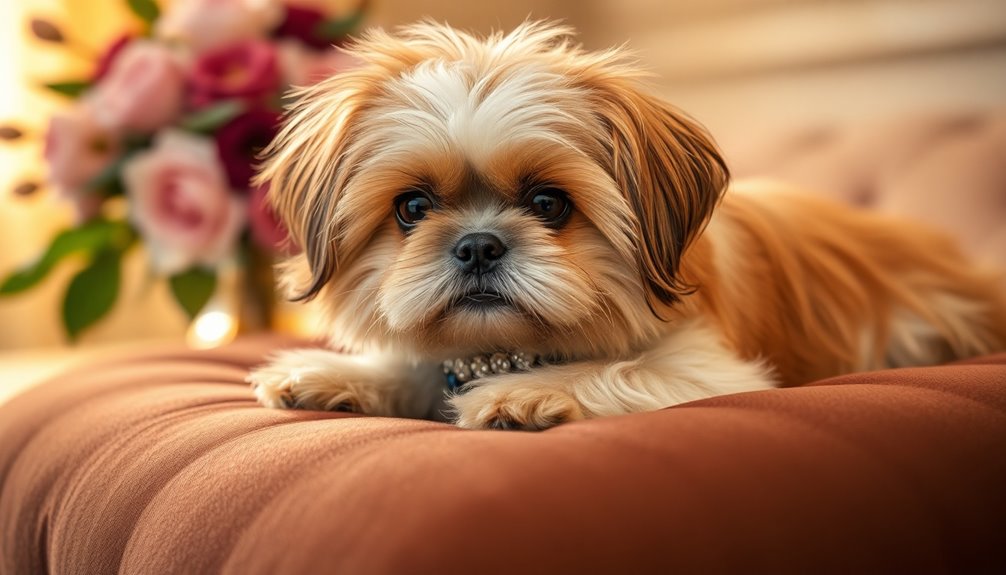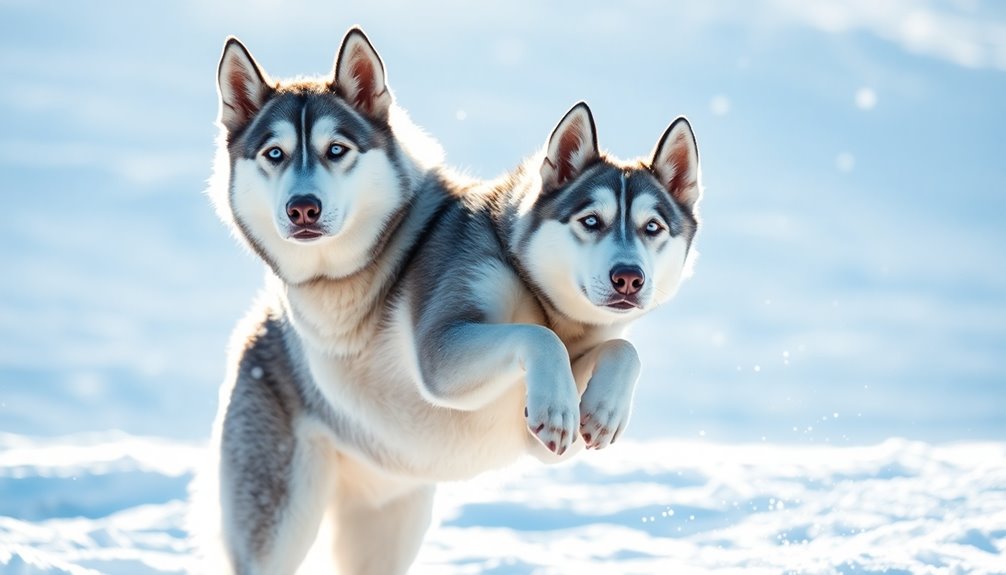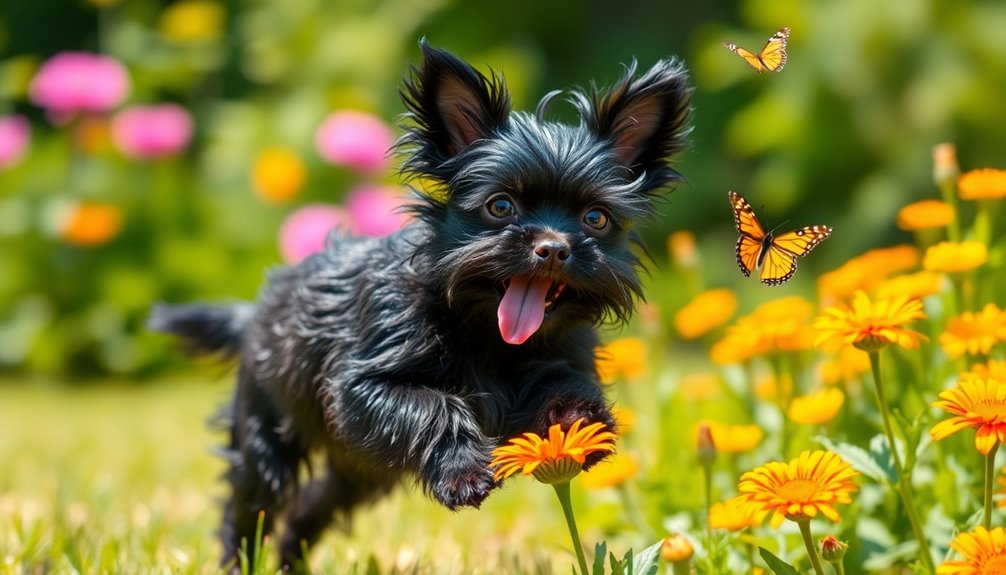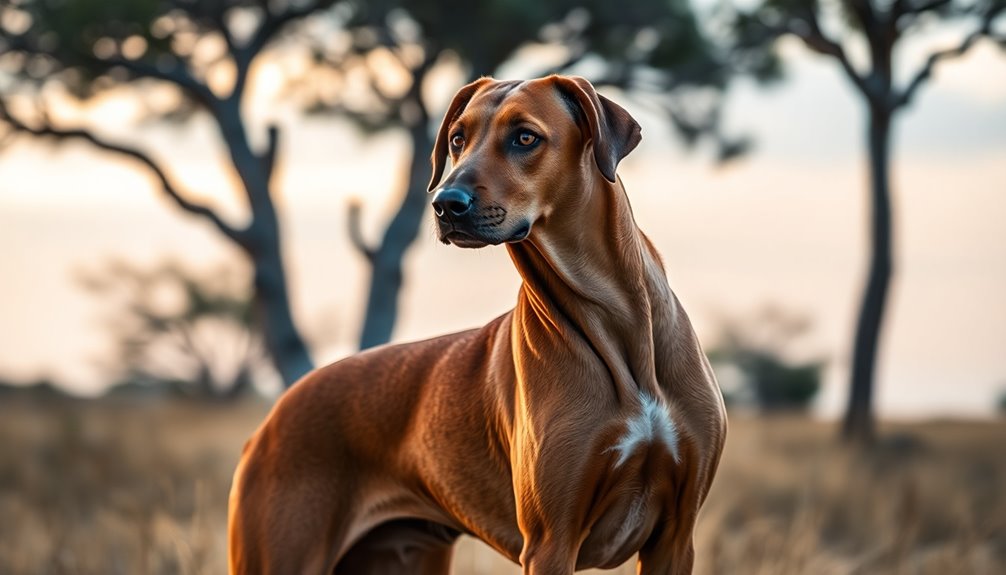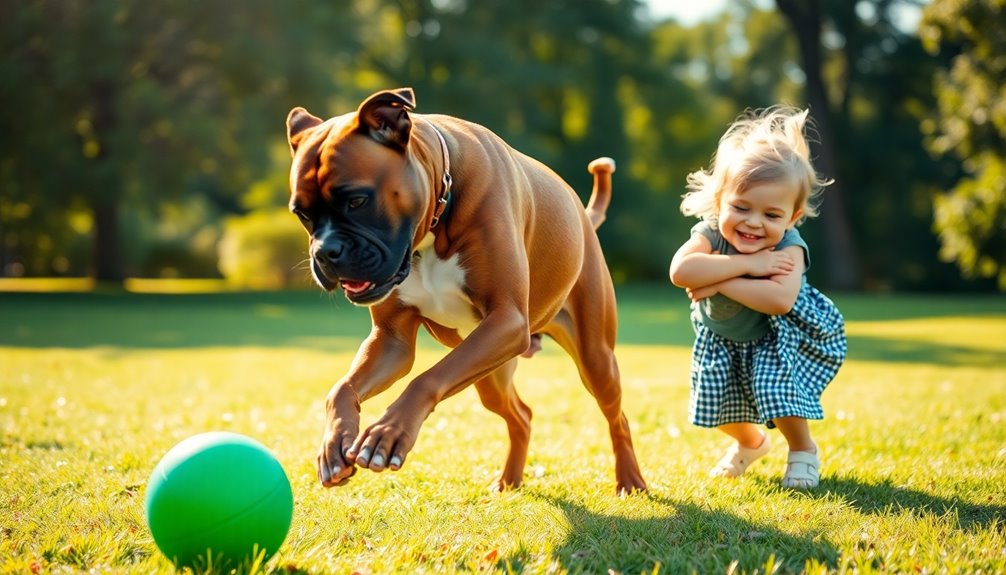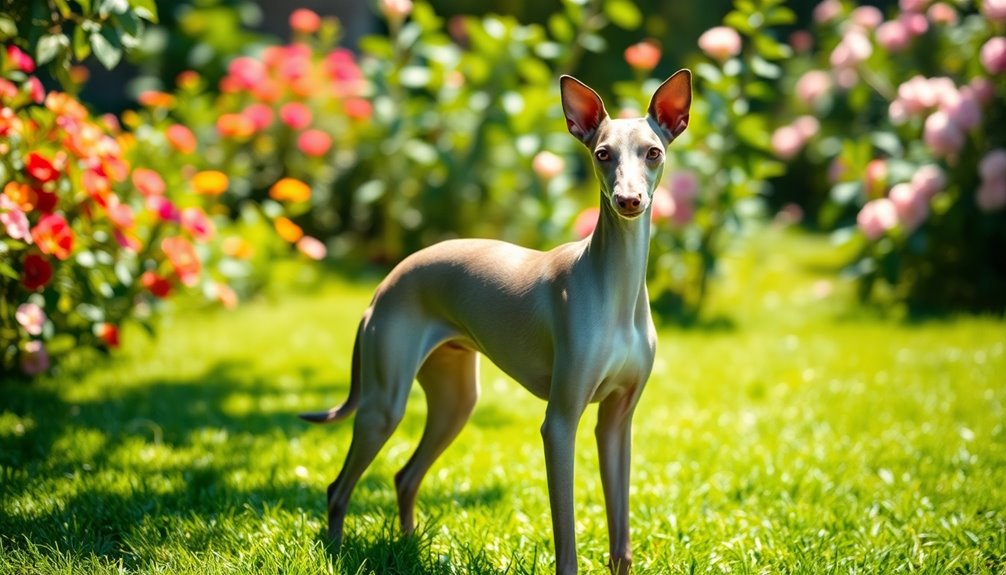Shih Tzus are the perfect blend of regal charm and affectionate companionship. Weighing between 9 to 16 pounds, these little lapdogs boast a distinctive look with their short snouts and rounded faces. Their friendly and bold personalities make them great family pets, thriving alongside kids and other animals. With a history tied to Chinese royalty, they bring a touch of nobility to any home. Regular grooming is essential to keep their silky coats looking vibrant. If you're curious about their care, health, and ideal living conditions, there's much more to discover about these lovable companions.
Key Takeaways
- Shih Tzus are known for their affectionate and loyal nature, making them ideal lapdogs for families and individuals alike.
- With origins as companions to Chinese royalty, they carry a regal appearance and a charming personality.
- Their long, silky double coat requires regular grooming to maintain its beauty and prevent matting.
- Shih Tzus thrive in cozy indoor environments and require moderate exercise, making them suitable for apartment living.
- They have a lifespan of 10 to 18 years, with proper care and regular veterinary check-ups contributing to their overall health.

Professional 4 in 1 Dog & Cat Grooming Scissors Kit with Safety Round Tips,Sharp & Durable,Dog Shears for Grooming – Includes Straight, Curved, Thinning Scissors and Comb – Premium Pet Supplies
【Professional Dog Grooming Scissors】This dog grooming kit includes 1* thinning shear, 1*curved scissor, 1* straight scissor and 1*…
As an affiliate, we earn on qualifying purchases.
As an affiliate, we earn on qualifying purchases.
Introduction
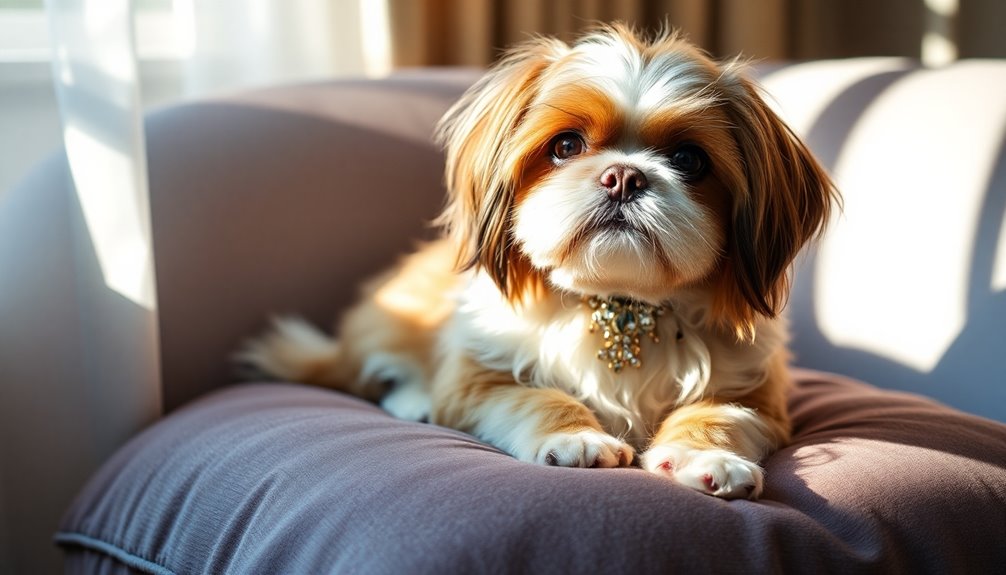
What makes the Shih Tzu such a beloved companion? Their charming physical characteristics play a significant role. Weighing between 9 to 16 pounds and standing about 9 to 10.5 inches tall, these small dogs have a distinctive appearance with a short snout, large dark eyes, and a slightly rounded face. Their double coat, featuring a dense undercoat and a long, silky topcoat, requires regular grooming to prevent tangles. You'll love their floppy ears and curled tail, both covered in long hair.
But it's their personality that truly captures hearts. Shih Tzus are affectionate and social, thriving on human interaction. Despite their small size, they exhibit a bold and confident demeanor. They are known as "Lion Dogs" due to their lion-like appearance, reflecting their regal origins. They're intelligent and alert, often responding to your emotions and needs. Their playful antics and moderate vocal tendencies add to their charm, making them delightful companions.
Training is straightforward with positive reinforcement, and early socialization helps them become well-adjusted adults. With a low activity level, they fit well in various living environments, including apartments. Their grooming needs and health considerations are essential to ensure a happy, healthy Shih Tzu.

BEAUTYZOO Winter Dog Coat with Harness Built in, Warm Dog Puffer Jacket Vest Padded Fleece Cold Weather Coats Windproof Waterproof Snow Jackets Clothes for Small Medium Puppy, Green XS
WINDPROOF & WATERPROOF & WARM — BEAUTYZOO dog coats outside are made of polyester waterproof memory fabric, soft…
As an affiliate, we earn on qualifying purchases.
As an affiliate, we earn on qualifying purchases.
History and Origin
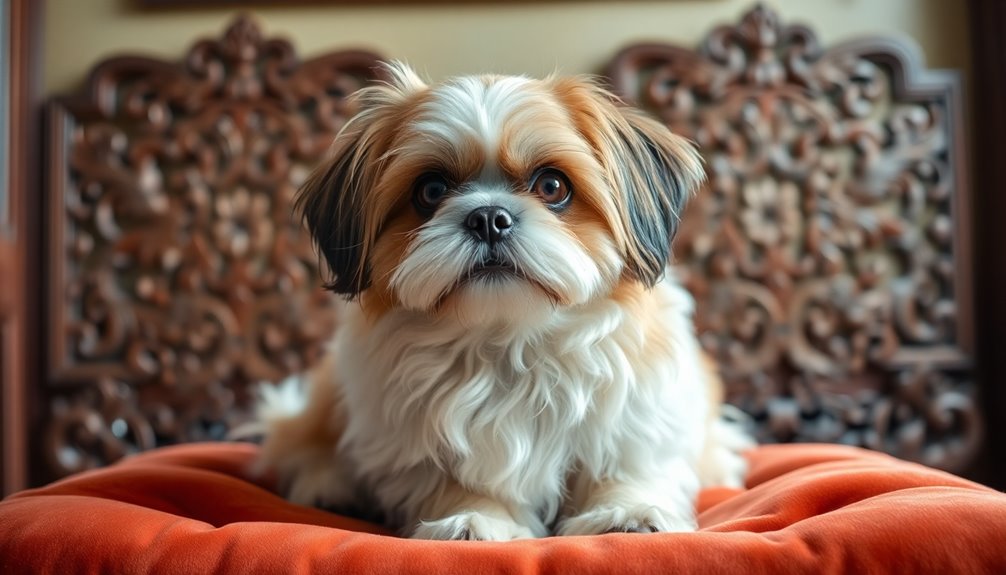
The Shih Tzu has its roots in Tibet, where it was developed and later cherished by Chinese royalty.
Evidence of this regal breed dates back to the Tang Dynasty around 824 A.D., showcasing its importance as a companion for emperors.
As you explore its history, you'll discover how these dogs became symbols of prestige and affection in royal courts. Additionally, during the Ming and Manchu Dynasties, Shih Tzus were bred and raised by palace eunuchs, making them exclusive property of the royal court.
Where and when the breed originated
Originating in the highlands of Tibet and possibly China, the Shih Tzu has a rich history that dates back centuries. Documentary evidence suggests that these charming dogs existed as early as 824 A.D., with short, square dogs appearing in China around 1000 B.C.
During the Tang Dynasty, under Empress Wu, breeding flourished, leading to the development of the breed we know today. Shih Tzus were often gifted to Chinese royalty from Tibet, thanks to Tibetan monks who bred them. They were influenced by dogs brought via the Silk Road, distinguishing them from breeds like the Lhasa Apso, Pug, and Pekingese.
The name "Shih Tzu" translates to "little lion," reflecting their lion-like features that were especially revered in Imperial courts. Culturally, these dogs were associated with the Tibetan Buddhist God of Learning and symbolized strength and protection in Chinese culture. Their presence in tapestries over 2000 years ago showcases their significance. However, the breed faced near extinction during the Communist Revolution, only to be saved by a mere 14 dogs, which eventually helped rebuild the Shih Tzu lineage. Notably, ownership of Shih Tzu was historically restricted to the Chinese imperial family, underscoring their status and rarity.
Royal Companion for Emperors
Throughout their history, Shih Tzus have been cherished as royal companions, particularly during the Ming and Manchu Dynasties. Bred and raised by palace eunuchs, these dogs became the exclusive property of the royal court, with severe penalties for non-royals who possessed them.
You'd often find them used as lap dogs and bed warmers, generating warmth for emperors and empresses by resting at their feet. Known as "sleeve dogs," they were carried inside the robes of noble women.
Shih Tzus weren't just pets; they symbolized good fortune and were revered as "Lion Dogs," thanks to their lion-like facial features. Their connection to Buddhist legends further elevated their status, as they were considered esteemed gifts that reflected respect and goodwill. Additionally, these dogs are believed to have originated in Tibet, not China, emphasizing their ancient roots and cultural significance.
They received royal treatment, adorned in the finest silks and decorative collars. These dogs played a role in diplomacy too, often gifted to foreign dignitaries as symbols of friendship.
The custom of gifting Shih Tzus has persisted, helping spread the breed beyond China. Their luxurious lifestyle and significance in imperial courts truly mark them as the regal lapdogs of history.

Royal Canin Breed Health Nutrition Shih Tzu Adult Dry Dog Food, 10 lb Bag
FORMULATED FOR PUREBRED SHIH TZUS: Royal Canin Shih Tzu Adult Dry Dog Food is designed to meet the…
As an affiliate, we earn on qualifying purchases.
As an affiliate, we earn on qualifying purchases.
Physical Characteristics
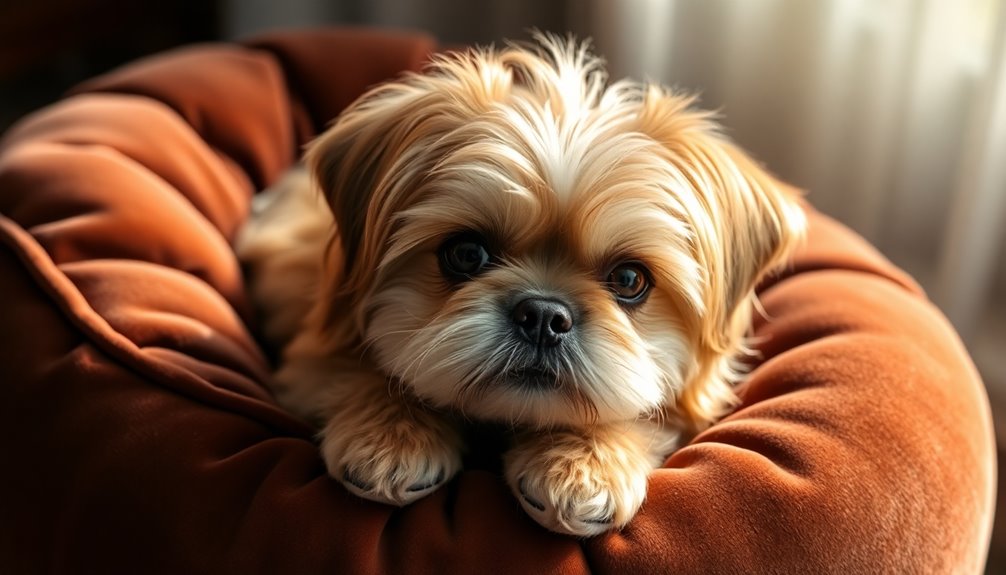
When you think of a Shih Tzu, picture a small but sturdy dog standing between 9 and 10.5 inches tall and weighing around 9 to 16 pounds.
Their long, silky double coat not only adds to their regal appearance but also requires regular grooming to keep it looking its best. Miniature Shih Tzus stand between 6 to 9 inches tall and weigh around 4 to 7 pounds, making them a delightful option for those seeking a smaller companion.
With various colors and patterns, these dogs truly stand out, showcasing their unique charm and elegance.
Size, weight, and coat details
With their charming stature and regal demeanor, Shih Tzus typically stand between 9 and 10.5 inches tall at the shoulder, making them the perfect lapdogs. These little companions have a slightly longer body than their height, giving them a balanced and elegant appearance.
Despite their small size, Shih Tzus possess a sturdy and robust build, proudly carrying themselves with confidence. Adult weight ranges from 9 to 16 pounds, which is essential to keep in mind when assessing their health.
When it comes to weight, adult Shih Tzus generally weigh between 9 and 16 pounds, although some can tip the scales between 8 and 20+ pounds. At three months, a puppy weighs between 3 and 7 pounds, while by six months, they'll weigh between 6 and 12 pounds. By one year, they reach their full size, typically weighing within the standard range.
Their coat is a standout feature, available in a variety of colors including white, black, and gold, often with unique patterns. The long, flowing coat requires regular grooming to maintain its beauty.
With their round, broad heads, large expressive eyes, and short square muzzles, Shih Tzus aren't just adorable; they're truly regal members of your family.
Fluffy Double Coat Texture
The Shih Tzu's fluffy double coat is one of its most enchanting physical characteristics. This breed features a soft, dense undercoat paired with a longer, coarser outer coat, creating a unique texture that's both luxurious and inviting. The outer layer is silky and flowing, while the undercoat feels fleecy and feathery, giving the Shih Tzu that signature puffy appearance.
However, maintaining this stunning coat requires effort. Regular brushing is crucial to prevent tangling and matting, especially since the double coat can easily intermingle. You'll want to brush your Shih Tzu daily with a wire brush to keep the coat healthy and remove dead hairs. Additionally, the transition phase of the coat is prominent between 4 to 12 months of age, so be prepared for changes during this time.
Additionally, baths every three to four weeks will help maintain cleanliness and vibrancy.
As your Shih Tzu matures, you might notice changes in its coat texture. Puppies start with a single layer, developing the outer coat by about 10 to 12 months. While they shed less than some breeds, consistent grooming is key to ensure your regal companion always looks its best.
Embrace the grooming routine, and you'll enjoy the beauty of your Shih Tzu's fluffy coat for years to come!

MAEELOU Small Dog Brush- Grooming Tool for Teddy, Yorkies, Maltese, Shih Tzu, Chihuahua – Puppy Hair Brush (Blue)
High-quality dog grooming tool: This small-sized dog brush is specially designed for small dog breeds such as Teddy…
As an affiliate, we earn on qualifying purchases.
As an affiliate, we earn on qualifying purchases.
Temperament and Personality
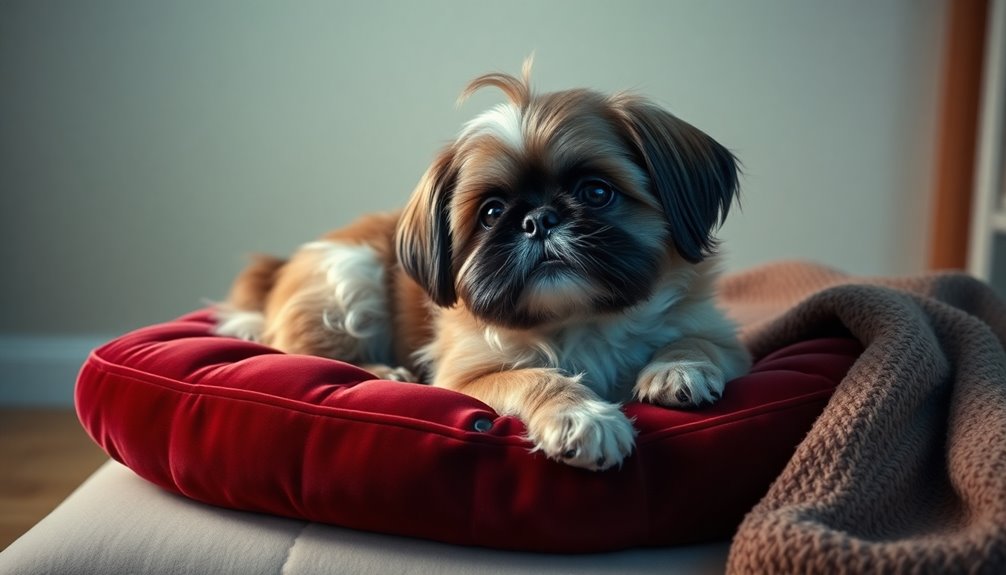
When you bring a Shih Tzu into your home, you'll quickly notice their playful and sociable nature. These dogs thrive in family settings and get along well with children and other pets, making them ideal companions for various lifestyles. Their affectionate personality ensures they'll keep you entertained and loved, creating a joyful atmosphere in your household. Additionally, their strong devotion to owners makes them particularly attentive and loyal companions.
Playful and Sociable Nature
In their playful moments, Shih Tzus showcase a vibrant energy that belies their small stature. You'll find them eagerly engaging in interactive games, whether it's tossing toys in the air or showing off their little tricks. They thrive on these playful activities, making every moment spent with you feel lively and joyful.
Shih Tzus love to participate in agility courses and other fun tasks that keep both their bodies and minds active. Their sociable nature shines through as they charm everyone they meet. These pups tend to be friendly, forming strong bonds with their families and getting along well with strangers. With proper socialization from a young age, they develop positive associations with people and other pets, making them even more enjoyable companions. You'll notice that they aren't overly yappy; rather, they appreciate the company of multiple people around them. Early socialization is essential to prevent fears and anxiety around other dogs and people.
Balanced in energy, Shih Tzus follow you around the house and delight in walks, yet they also enjoy quiet moments, like sunbathing. Regular play and social interaction are essential to keep them happy and prevent feelings of isolation.
Their affectionate and sociable nature makes them wonderful companions in any home.
Suitability for families, individuals, or other pets
Shih Tzus are exceptionally versatile dogs, making them great companions for families, individuals, and even other pets. Their adaptability shines in various home environments, especially those with children. You'll find these gentle and loyal dogs to be tender playmates, but proper socialization is key. Teach your kids to respect boundaries to ensure everyone enjoys a happy relationship. For individuals, Shih Tzus are affectionate lap dogs that thrive on human interaction. They're alert and intelligent, quickly picking up on your emotions, making them responsive companions. Their small size makes them safer around children and elderly family members, contributing to their reputation as family-friendly pets. Additionally, they can benefit from nutrient-rich diets, which support their overall health and vitality.
While they can be vocal, this is just part of their charming personality. When it comes to other pets, Shih Tzus generally get along well with cats and rabbits if introduced slowly. However, be cautious with smaller pets like hamsters or guinea pigs; their playful nature could lead to unwanted chases. Always supervise interactions to maintain harmony.
Health and Lifespan
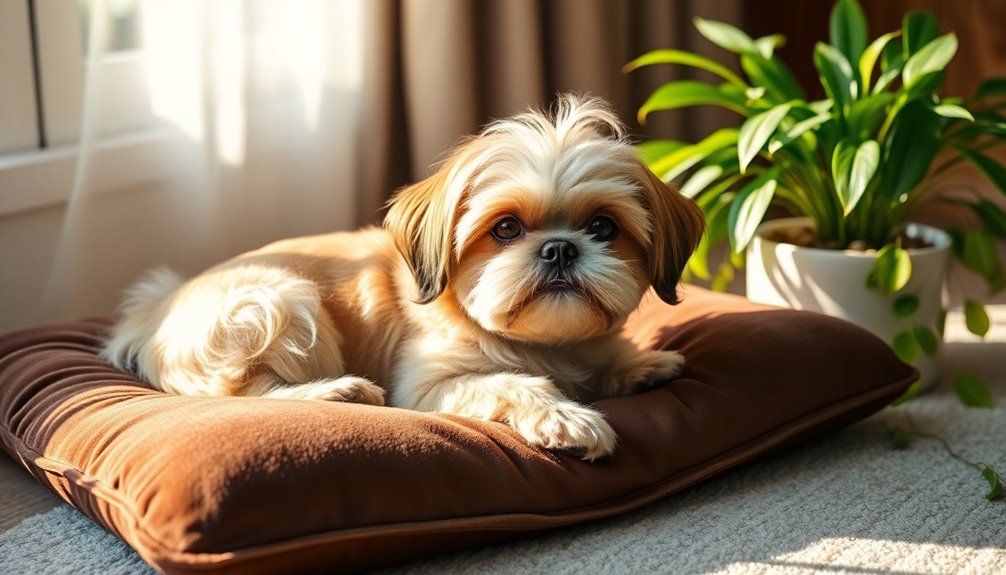
When it comes to health and lifespan, Shih Tzus typically live between 10 and 18 years, with many reaching the average of 12 to 16 years. While they're generally healthy, they can face common issues like breathing difficulties due to their flat faces. To help your Shih Tzu thrive, focus on proper nutrition, regular vet visits, and staying alert for any health changes. Additionally, genetics play a crucial role in determining their overall longevity and susceptibility to health issues.
Typical lifespan of the breed
Many pet owners find that the typical lifespan of a Shih Tzu ranges between 10 to 18 years, with the average being just over 13 years. While some Shih Tzus may live up to 16 years or more, the oldest recorded Shih Tzu reached an impressive 23 years. Their small size contributes to their relatively long lifespan, but several factors can influence how long your furry friend stays by your side.
Genetics plays a significant role in determining lifespan, so it's crucial to choose a reputable breeder. A balanced diet and proper nutrition are vital for overall health and longevity, so invest in high-quality dog food. Regular veterinary care, including vaccinations and dental check-ups, is essential to catch any potential health issues early, as early detection of health issues can significantly improve their quality of life.
Creating a safe, toxin-free living environment can further enhance your Shih Tzu's quality of life. Regular exercise and weight management keep them healthy and active.
Common health concerns or genetic predispositions
Understanding the common health concerns and genetic predispositions of the Shih Tzu is essential for ensuring their well-being and longevity.
One major issue is Degenerative Myelopathy (DM), akin to ALS in humans, which can lead to hind limb degeneration. While 69.6% of tested Shih Tzus are clear, 26.9% are carriers, so it's crucial to be aware of this condition.
Portosystemic Shunt (PSS) is another concern, where blood bypasses the liver, affecting growth and causing potential seizures. This condition can be identified through liver function tests and may require surgery or a special diet.
Congenital Dyshormonogenic Hypothyroidism affects thyroid hormone production, leading to goiters and metabolic issues due to genetic mutations. Additionally, early veterinary care is important for managing these conditions effectively.
Chondrodystrophy and Intervertebral Disc Disease (CDDY/IVDD) can result in back pain and mobility problems, particularly in older dogs.
Joint issues, including patellar luxation and hip dysplasia, are also common. Regular veterinary check-ups and attention to dental health are vital since dental disease affects around 80% of dogs by age two.
Keeping these concerns in mind will help you maintain your Shih Tzu's health.
Tips for maintaining health and wellness
Regularly maintaining your Shih Tzu's health and wellness is vital for a long, happy life. Start with a balanced diet; choose high-quality dog food rich in essential nutrients, and incorporate fresh vegetables, lean proteins, and omega-3 fatty acids. Additionally, consider adding age-appropriate food to their diet to ensure balanced protein and calcium intake. It's important to be aware that proper disposal habits can extend your pet's lifespan by reducing health risks associated with waste exposure.
Monitor their weight to prevent obesity, as small breeds are particularly prone. Stick to their diet and avoid giving them people food.
Next, ensure your Shih Tzu gets regular exercise. Short daily walks and interactive play sessions are usually sufficient. Cardio exercises help maintain metabolism and overall heart health. Just be careful not to overdo it, as your Shih Tzu's low-energy nature means moderation is key.
Grooming is also important. Use quality grooming products and brush their coat weekly to prevent matting. Daily brushing not only keeps their coat healthy but also strengthens the bond between you and your pet.
Don't forget dental care; brush their teeth at least three times a week with canine toothpaste. Regular dental care can help prevent infections and tooth decay, ensuring your Shih Tzu's overall well-being.
Finally, prioritize healthcare by scheduling regular veterinary check-ups for early detection of health issues. Keep an eye out for signs of aging or behavioral changes and address them promptly. Providing filtered water and considering pet health insurance will further support your beloved companion's health and longevity.
Care Requirements

Caring for your Shih Tzu involves regular brushing to keep their coat healthy and tangle-free. Additionally, it is important to monitor their weight closely, as obesity is a common concern in this breed. You'll also need to provide them with short walks and engaging playtime to meet their exercise needs. Lastly, focusing on a balanced diet will help maintain their overall health and energy levels.
Regular Brushing Required
To keep your Shih Tzu's luxurious coat looking its best, daily brushing is essential, especially for those with long hair. This prevents matting and tangling, ensuring that their coat remains silky and healthy. If your Shih Tzu has a shorter coat, brushing 2-3 times a week will suffice, but don't skip it altogether. Regular brushing helps distribute natural oils, keeps dirt and debris at bay, and promotes overall coat health.
For daily grooming, a slicker brush is ideal. You might also want to use a metal grooming comb for those tricky tangles or hard-to-reach spots. Consider a pin brush and comb combination for a thorough grooming experience. Before brushing a dry coat, mist it lightly with a hydrating spray for easier detangling.
When brushing, start at the head and work down to avoid further matting. Gently tackle any knots to prevent pain or damage. Brush from the bottom up to free tangles effectively. Additionally, regular brushing helps to identify potential skin issues early on, allowing for timely interventions.
Regular brushing doesn't just keep your Shih Tzu looking great; it also strengthens your bond and helps you spot any skin issues early on.
Exercise requirements and energy levels
Grooming your Shih Tzu is just one part of their care; meeting their exercise needs is equally important for their overall well-being. Adult Shih Tzus require about 40 minutes of exercise daily, which can be split into two or three shorter sessions. Ideally, you should take them for two 30-minute walks each day.
For puppies under six months, structured walks aren't necessary, but they still need playtime to run around the house.
Walking is one of the best exercises for Shih Tzus, but indoor activities play a vital role too. Consider games like hide-and-seek or fetch, and interactive puzzle toys can keep their minds stimulated. Short outdoor walks combined with indoor playtime will meet their exercise needs effectively. Additionally, engaging in regular exercise fosters mental satisfaction for your Shih Tzu, providing important sensory stimulation. Regular physical activity also helps prevent obesity, which is a concern for many breeds, including brachycephalic dogs.
Keep in mind that senior Shih Tzus will need less activity—cut their routine in half. As a brachycephalic breed, they can struggle with breathing and heat, so avoid exercising during peak hot hours and always monitor for signs of fatigue.
Ensuring they stay hydrated during and after exercise is crucial for their health, helping maintain their cardiovascular well-being and immune system strength.
Feeding tips and diet recommendations
Feeding your Shih Tzu is essential for their health and vitality. Adult Shih Tzus require a diet consisting of 15-20% protein, while puppies need 20-25%. Choose high-quality protein sources like beef, chicken, turkey, lamb, duck, eggs, or fish to support their body functions. A raw food diet can promote optimal energy and health through high-protein diets.
Caloric intake is also crucial; adults need around 340 calories daily, while puppies and seniors require about 280. Generally, feed puppies 1.0oz to 2.0oz daily, and adults 2.0oz to 3.4oz. To calculate specific needs, aim for 40-55 calories per pound for puppies and 80-140 calories per pound for adults.
For feeding schedules, puppies under three months should eat freely, while those between three to twelve months should have 3-4 meals daily. Adults should be fed at least three times a day. Automated treat dispensers can help with mid-day meals if you're not home.
Consider adding essential fatty acids for a shiny coat, vitamins for overall health, and fiber for digestion, especially in seniors.
A balanced diet tailored to their age and health will keep your Shih Tzu happy and thriving.
Training and Socialization
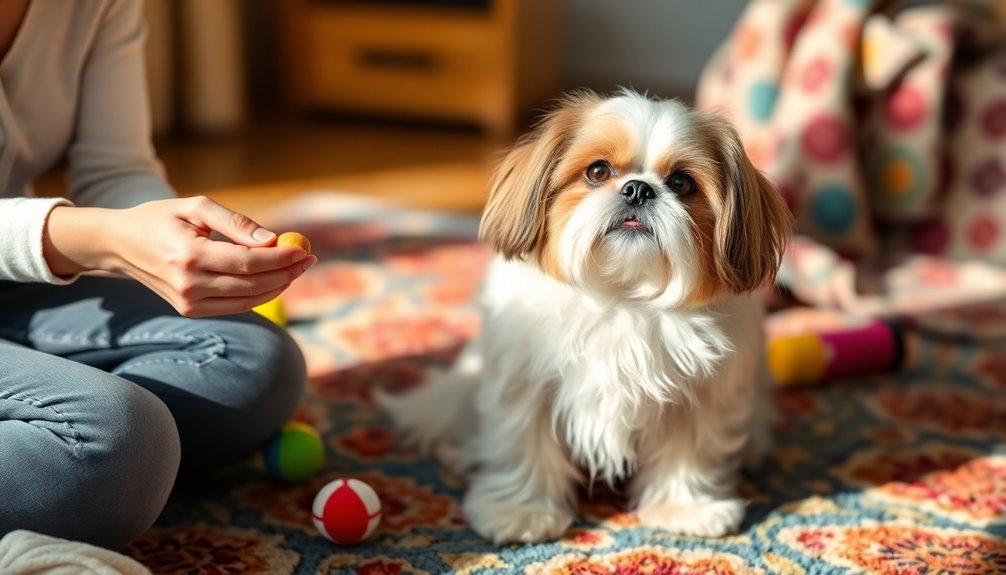
Training a Shih Tzu can be a rewarding yet challenging experience due to their moderately stubborn tendencies. To enhance their learning, focus on using positive reward training techniques, which can significantly motivate them to follow commands. You'll want to introduce new friends gradually to ensure they feel comfortable and secure. Additionally, house training may require patience and consistency, but with the right approach, you'll set your Shih Tzu up for success. Regular outings to puppy training classes can also provide valuable socialization opportunities for your Shih Tzu.
Moderately Stubborn Training Tendencies
When it comes to training Shih Tzus, their moderately stubborn tendencies can pose a challenge for owners. This independence, rooted in their history as companion dogs for Chinese royalty, often leads to resistance, especially when it comes to obeying commands or moving from their favorite spots. To manage these instincts, consistent and patient training methods are essential.
You'll find that Shih Tzus respond poorly to harsh training techniques; they're sensitive dogs that thrive on gentle approaches. Positive reinforcement is key—using treats, praise, and affection will encourage compliance. Additionally, it's important to recognize their independent nature, as understanding this trait can improve training outcomes. Implementing effective communication strategies during training can also enhance the bond between you and your Shih Tzu.
Keep training sessions short and engaging to maintain their attention, and consider rotating skills to prevent monotony. Incorporate interactive games for mental stimulation, and occasionally change the training environment to keep things fresh.
Consistency in commands helps clarify expectations, while socialization opportunities can foster a more adaptable attitude. If you encounter persistent stubbornness, don't hesitate to seek guidance from a professional dog trainer.
Gradual Introductions to New Friends
Building on the foundation of training, introducing your Shih Tzu to new friends—both people and other animals—can significantly enhance their social skills and confidence. Start by exposing your puppy to individuals of different ages, sizes, and backgrounds. Ensure these interactions include various facial features, clothing, and voices.
Organize controlled meetings with friends, family, and even strangers, using positive reinforcement techniques like treats and praise to encourage good behavior. This approach aligns with the principle of positive experiences during socialization, which leads to better adaptability in new experiences. Additionally, it's beneficial to make sure that your puppy's interactions are consistent, as routine exposure helps them feel more secure.
When socializing with other animals, arrange playdates with vaccinated puppies or gentle older dogs. Begin with visual introductions for any other pets in your household and gradually progress to supervised interactions, ensuring all experiences remain positive.
Don't forget to expose your Shih Tzu to different environments. Take them to parks, markets, and friends' homes, starting with short visits and gradually increasing the duration. Use treats to make these outings enjoyable.
Finally, introduce your puppy to car rides by starting with short trips. Secure them safely and provide treats to create a positive association with travel. This gradual approach will help your Shih Tzu become a well-adjusted and sociable companion.
House Training Difficulties
House training a Shih Tzu can sometimes feel like a challenging puzzle, but with the right strategies, you can simplify the process. Start by creating a consistent potty schedule. Feed your Shih Tzu at the same times daily, and take them outside immediately after meals, as they typically need to go within 15 to 30 minutes.
Don't forget frequent breaks first thing in the morning, after play, and before bed. Also, be prepared for unanticipated bathroom breaks since Shih Tzus can't hold it for long.
Designate a specific potty spot outside. This helps your puppy understand where it's okay to go. Use the same spot consistently, allowing their scent to encourage them to return there automatically. Establishing a routine is particularly beneficial, as it aids in faster learning for your puppy.
Use positive reinforcement when your Shih Tzu goes in the right place—praise and treats work wonders. If accidents happen, calmly redirect them to the potty spot without punishment.
Observe your pup's signals, like sniffing or whining, and respond quickly to prevent mishaps. Consistency is key, so maintain the routine and be patient throughout the training process.
Ideal Living Environment
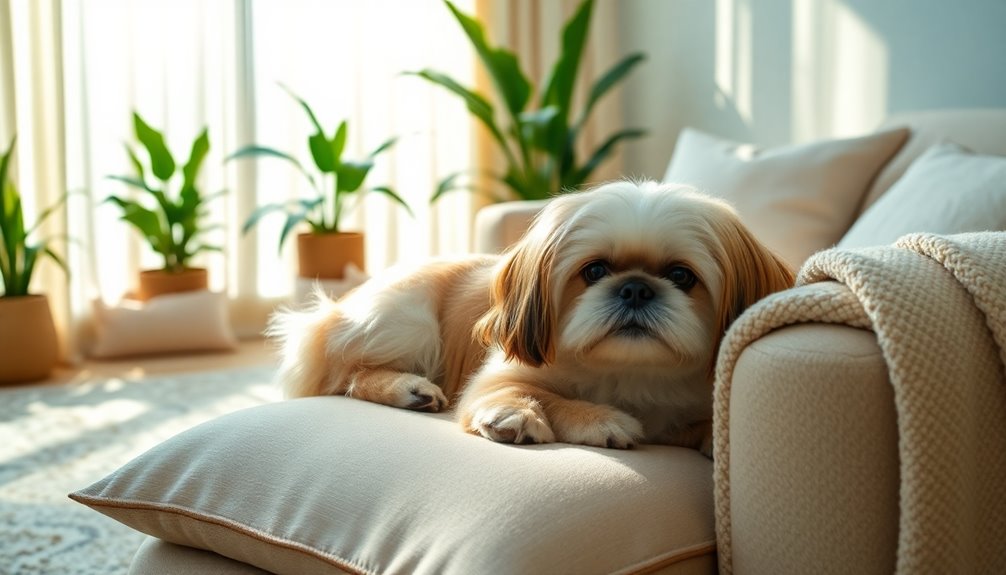
Shih Tzus thrive in cozy indoor spaces where they can snuggle up with you. They prefer mild, temperate climates that keep them comfortable and healthy, so it's essential to maintain a stable indoor temperature. Their social nature means they thrive on human attention, making them perfect companions for indoor living.
Cozy Indoor Spaces Preferred
For a Shih Tzu, cozy indoor spaces are more than just a preference—they're a necessity. These little dogs thrive in small living areas, making them perfect companions for apartment dwellers. Their compact size allows them to navigate tight spaces easily, so you won't need a mansion for them to feel comfortable. Just a cozy bed, a designated spot for food and water, and a space for their toys will suffice.
With moderate exercise needs, your Shih Tzu won't require excessive outdoor activity. About 30 minutes of daily exercise, split into two sessions, can easily be achieved with indoor games and short walks. This makes them a great fit for your busy lifestyle. Additionally, their adaptability to various environments means they can comfortably adjust to different living situations, enhancing their role as ideal indoor companions.
Their affectionate and sociable nature means they love being close to you. They thrive on human interaction, so ensuring they've your company will keep them happy and engaged. Early socialization helps them adapt well to various home environments and reduces any shyness.
Lastly, keeping their minds active is crucial. Providing interactive toys and engaging in training sessions not only aids in preventing boredom but also reinforces good behavior in confined spaces.
Prefers Mild, Temperate Climates
A comfortable living environment significantly impacts a Shih Tzu's well-being, and these dogs thrive best in mild, temperate climates. While they can adapt to various climate zones, extreme heat and cold can pose serious risks to their health. Hot weather increases the chances of heatstroke, while freezing temperatures can compromise their double coat's insulation. For optimal comfort, aim to keep indoor temperatures between 68°F and 78°F (20°C – 25°C).
Warm coats or sweaters are advisable during chilly walks, but avoid exposing your Shih Tzu to harsh winter conditions for too long. In warmer climates, provide an air-conditioned space to prevent overheating, and limit outdoor activities during peak heat hours. It's important to note that Shih Tzus are prone to respiratory problems due to their flat faces, making them more vulnerable in extreme weather conditions.
Always ensure your Shih Tzu has access to shade and fresh water during sunny days, and consider pet-safe sunscreen. Be vigilant for signs of overheating, such as excessive panting or lethargy. Regular grooming helps manage their coat, making it easier for them to cope with varying temperatures. Ultimately, maintaining a stable, comfortable environment is key to keeping your Shih Tzu happy and healthy throughout the seasons.
Royal Guard for Chinese Palaces
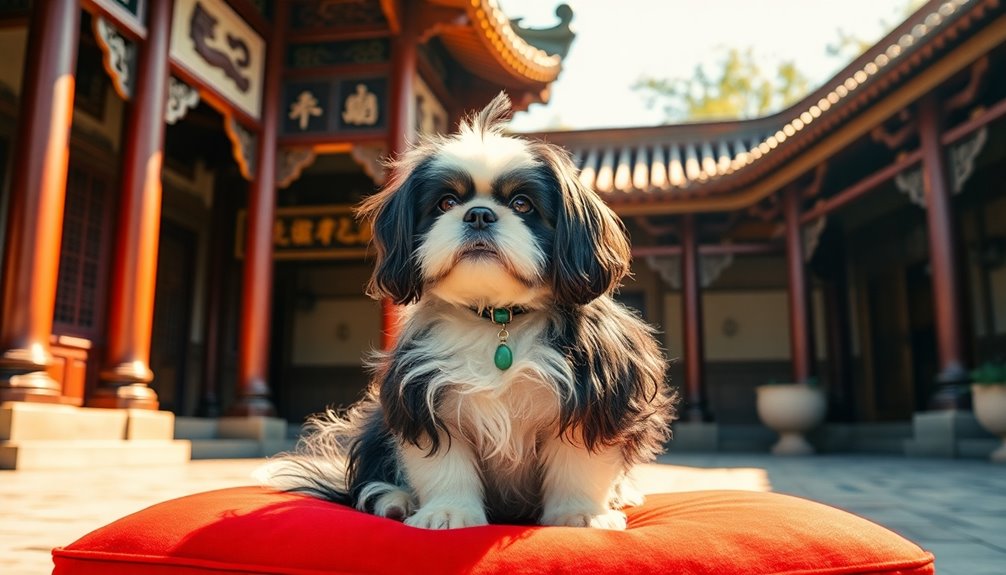
As you explore the history of the Shih Tzu, you'll find that this ancient breed, once referred to as the "lion dog," played a crucial role in Chinese palaces. These regal companions weren't just lapdogs; they symbolized power and fortune within the royal court. Shih Tzus were pampered with fine silks that highlighted their esteemed status and luxurious treatment. Today, their connection to royalty continues to influence their status as Hollywood's favorite companion dog.
Ancient Breed, Once Called "Lion Dog
Shih Tzus, often referred to as "lion dogs," have a rich history intertwined with Chinese royalty. Originating during the Tang Dynasty, these ancient breeds were cherished companions of imperial families.
You'd find them pampered in royal palaces, living luxuriously in silk-lined spaces and adorned with decorative collars. Only the elite could own a Shih Tzu, with severe penalties for anyone else who dared to possess one. This exclusivity reflects their royal status, as ownership was forbidden for anyone below nobility.
Their lion-like appearance earned them high esteem, reflecting their name, which translates to "lion dog." These little dogs weren't just for show; they acted as guard dogs, alerting the royal family of approaching visitors.
Eunuchs played a key role in their breeding and care, ensuring that the finest specimens thrived.
Shih Tzus are also linked to Buddhist mythology, adding to their regal aura. Their charming personalities and protective nature made them beloved companions.
Today, you can still see the Shih Tzu's enchanting character and luxurious lineage in their playful demeanor, reminding us of their esteemed past within the walls of Chinese palaces.
Hollywood's Favorite Companion Dog
In Hollywood, the Shih Tzu has become a beloved companion, often seen trotting alongside celebrities who appreciate their charm and elegance. Icons like Marilyn Monroe, who owned a Shih Tzu named Maf, and Simon Cowell, with his two dogs Squiddly and Diddly, showcase the breed's appeal.
Betty White cherished her Shih Tzu, Pontiac, while Geri Halliwell frequently took her furry friend, Harry, to events. Even Bill Gates has embraced this regal breed as a loyal companion. The Shih Tzu's popularity among public figures reflects the growing trend towards celebrity lifestyles that include pampered pets.
Shih Tzus have graced movies and TV shows, adding a touch of cuteness and sophistication to various productions. Their roles as pampered pets of movie stars and beloved companions in family sitcoms have solidified their status in popular culture. Originally bred as companion dogs, Shih Tzus' gentle temperament and strong desire for human interaction further enhance their desirability.
With their luxurious coats and charming personalities, Shih Tzus effortlessly steal the spotlight.
As they transitioned from royal gifts in Chinese palaces to Western celebrity homes, Shih Tzus became highly sought after. Their affectionate nature and adaptability make them perfect companions for anyone, whether families, singles, or seniors.
With regular grooming to maintain their regal appearance, these little lapdogs continue to captivate hearts across the globe.
Ideal for Apartment Living?
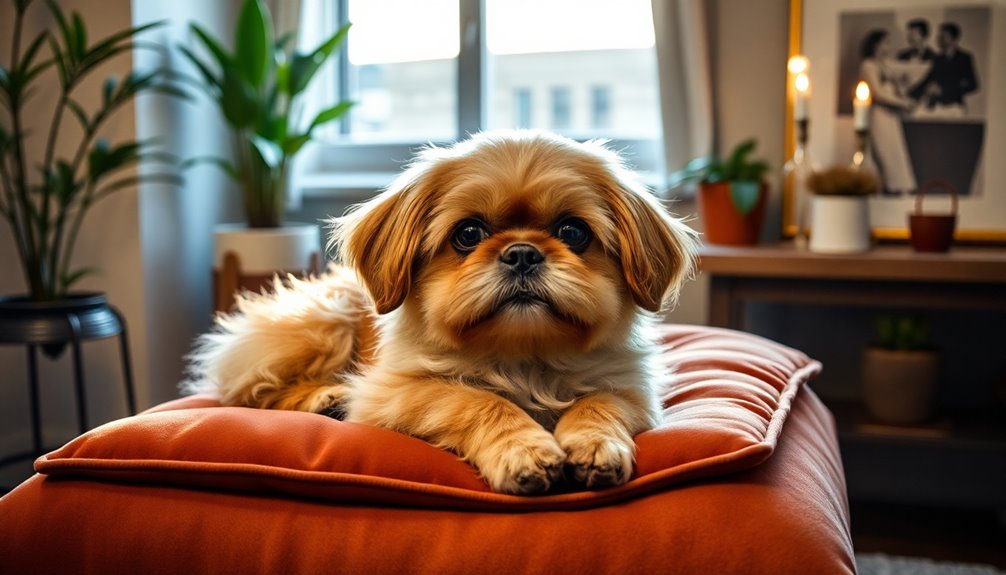
If you're a senior or single, a Shih Tzu might be the perfect companion for apartment living. Their small size and low barking tendencies make them ideal for cozy spaces, but you'll need to consider grooming costs and regular upkeep. With some attention and care, these regal lapdogs can thrive in your home. Their adaptability to apartment settings ensures that they can live comfortably without needing a large area.
Great for Seniors and Singles
Finding the perfect companion for apartment living can be a challenge, but the Shih Tzu stands out as an ideal choice for seniors and singles alike. Their small size and manageable energy levels make them perfect for smaller spaces. You won't need to worry about them requiring extensive exercise; daily walks and indoor play will keep them happy and healthy. Shih Tzus typically have a lifespan ranging from 10 to 16 years, which means you can enjoy their companionship for many years. Additionally, studies show that pets can enhance emotional well-being, making the Shih Tzu a valuable companion for those experiencing anxiety and depression.
For seniors, Shih Tzus are gentle and patient, thriving on human companionship. Their affectionate nature fosters strong bonds, providing comfort and companionship. You'll find that their moderate exercise needs can easily fit into your routine, making them a breeze to care for.
Singles will also appreciate the Shih Tzu's sociable demeanor. They love being close to you and adapt well to smaller living environments. Regular socialization is key to their development, so take them on neighborhood walks and to pet-friendly spots to build their confidence.
With their low barking tendencies, Shih Tzus are considerate neighbors, ensuring a peaceful atmosphere in your apartment. By training them early, you'll avoid disturbances, making the Shih Tzu not just a pet but a true companion in your daily life.
Grooming Needs and Costs
Grooming a Shih Tzu is essential for maintaining their beautiful coat and overall health, especially in apartment living where space might be limited. You'll need to commit to regular grooming sessions, ideally brushing daily or several times a week to prevent tangles. Regular baths keep their coats clean, while routine trims ensure they look their best.
Don't forget about nail trimming, ear cleaning, and occasionally shaving under their pads. If you're considering professional grooming, be prepared for costs ranging from $40 to $100 per session every 4 to 6 weeks. This can add up to an annual expenditure between $400 and $1,000, especially with added services like sanitary shaves.
If you opt for DIY grooming, you'll need to invest about $500 upfront for tools and then around $150 annually for replacements. Regular brushing helps prevent mats, which is crucial for maintaining the coat's quality and appearance.
Regardless of your choice, grooming requires time and effort. Shih Tzus thrive on your attention, so consistency is key to keeping them happy and healthy. With a solid grooming routine, apartment living can be quite manageable for both you and your furry friend!
Frequently Asked Questions
How Much Do Shih Tzus Typically Weigh?
Shih Tzus typically weigh between 9 and 16 lbs (4 to 7 kg) when fully grown, regardless of gender.
At three months, they usually weigh between 3 and 7 lbs, and by six months, they range from 6 to 11 lbs.
Most reach their adult weight by ten months.
Factors like genetics, diet, exercise, and overall health can influence their weight, so it's important to monitor their condition regularly for a healthy lifestyle.
Do Shih Tzus Shed a Lot?
Shih Tzus don't shed a lot compared to other breeds.
You'll find they're categorized as low shedders, with only 10 to 15% of their coat in the shedding phase at any time.
Seasonal changes can increase shedding slightly, but it's usually less noticeable due to their double coat.
Regular grooming helps manage loose hair, ensuring your home stays clean and your furry friend's coat remains healthy.
What Colors Do Shih Tzus Come In?
Shih Tzus come in a variety of colors that can be quite striking.
You'll find solid black, blue with a metallic sheen, liver, silver, and red, ranging from honey to mahogany. Rare hues like lavender and dark chocolate also exist.
Additionally, you'll see unique patterns like tan "Dobie" markings or brindle stripes.
Keep an eye out for those multi-color combinations, which can be beautifully symmetrical or asymmetrical, adding to their charm.
Are Shih Tzus Good With Children?
Yes, Shih Tzus are generally good with children. Their friendly and affectionate nature makes them great companions for kids.
They typically exhibit gentleness and patience, forming strong bonds with children in the household.
However, you should supervise interactions, especially with new or unfamiliar children, to ensure safety.
Teaching kids to approach gently and respect the dog's space is essential, helping create a positive environment for everyone involved.
How Often Do Shih Tzus Need Grooming?
You should groom your Shih Tzu regularly to keep their coat healthy and tangle-free.
Daily brushing is recommended to prevent mats, starting from the head and working down to the tail.
Bathing every three to four weeks keeps their skin clean and healthy, while haircuts every six to eight weeks maintain manageability.
Don't forget to trim their nails monthly and check their paws for debris to ensure overall well-being.
Conclusion
In conclusion, the Shih Tzu is more than just a cute face; they're affectionate companions with a rich history. Their regal demeanor and playful personality make them perfect for families and individuals alike. Whether you live in a cozy apartment or a spacious home, these lapdogs thrive on love and attention. With proper care and training, your Shih Tzu will become a loyal friend, bringing joy and warmth to your life. Embrace the charm of this delightful breed!

